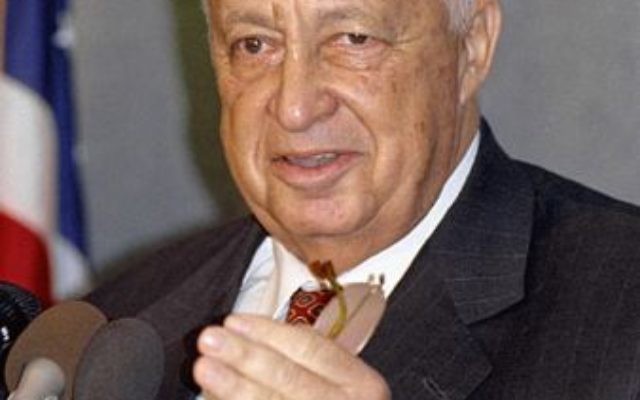Legendary leader farewelled
When Ariel Sharon was lowered into the ground of the Negev Desert on Monday, Israel didn’t just say farewell to a leader; it said goodbye to an era.
Sharon was almost certainly the last prime minister who had helped to establish the state that he went on to lead. He was a commander in the 1948 War of Independence.
He joined the Haganah pre-state militia in 1942, and only stopped serving the Jewish State in 2006 when a stroke prematurely removed him from office as prime minister.
During his 30-year military career he led anti-terrorist reprisals and held several senior positions. He then spent three decades in politics, which saw him pushing forward settlement in the West Bank and Gaza, strongly promoting aliyah, and promoting Israeli security, especially through his anti-terror operations during the Second Intifada and by starting construction of the West Bank separation barrier.
Domestically, he both built up the Likud party and then realigned the political map by leaving it, when he was party leader, and forming the Kadima party – giving a new lease of life to Israeli centrism.
Mourners on the day of the funeral tried to capture this multifaceted figure.
“Arik, you were the shoulder on whom Israel’s security rested,” said President Shimon Peres. “Your footprints are imprinted on every hill and in every valley. You cultivated the land with your scythe and defended it with your sword. Your fingerprints are on every diplomatic situation and every military outpost. You took and implemented the difficult decisions.”
Sharon’s son Gilad also stressed his father’s various achievements. “There was no field in which you did not make your mark,” he said, addressing the former prime minister. “In agriculture, in industry, in construction, in immigration, in foreign relations, and more.”
There was a strong military element to the funeral day, with salutes and with generals carrying Sharon to his final resting place overlooking his Negev ranch. Chief of Staff Benny Gantz said: “I have come to tell you how the military that defends the Jewish people, that was so dear to you, will continue to do so, in your image and with your vision for many more years.”
Gantz stressed Sharon’s commitment to fighting terrorism during the Second Intifada. “As prime minister, you showed unparalleled political leadership and determined defence in the face of horrific terror, during a time in which it was the most complicated and daunting challenge,” he said.
Summing up Sharon’s general contribution to the military, Gantz declared: “I believe that there is no battlefield theory or strategy that does not carry your fingerprint. There is an endless amount written about the historic battles in which you fought, but there is one phrase that I believe accurately describes what you led – ‘the fighting spirit’.”
According to Defence Minister Moshe Ya’alon, Sharon “was first and foremost an extraordinary military commander that turned the IDF into an army that confronts the enemy and quickly prevails. He displayed his military leadership in the battlefield, both in battles against regular armies and in the fight against terrorism.”
When speaking of Sharon’s military achievements, Prime Minister Benjamin Netanyahu stressed the sense of Jewish mission that drove him. “I think that he represents the generation of Jewish warriors that arose for our people upon the resumption of our independence,” said Netanyahu. “He was tied to the land; he knew that it had to be defended. He understood that above everything, our revival is our ability to defend ourselves by ourselves.
“I believe that he will be remembered in the heart of the Jewish people forever as one of our most outstanding leaders and most daring commanders.”
Justice Minister Tzipi Livni, who followed Sharon from Likud to the Kadima party, and went on to lead Kadima, spoke of his “Jewish heart that was concerned about the Jewish people around the world”.
“He was a prime minister who became a great father of a great nation – a father who made us feel secure,” Livni said.
It was not only Israelis who emphasised Sharon’s commitment to the Jewish people. US Vice-President Joe Biden said in a tribute speech that “like all historic leaders, all real leaders, he had a North Star that guided him – a North Star from which he never, in my observation, never deviated. His North Star was the survival of the State of Israel and the Jewish people, wherever they resided.”
Former British prime minister Tony Blair, today the Quartet’s envoy to the Middle East, connected the themes of Sharon’s military accomplishment and his decision, towards the end of his life, to unilaterally withdraw from Gaza. He was “a warrior to create his country, yet wise enough to know that war alone could not secure its future”, Blair said.
In his view Sharon was no utopian, but did try hard with the Gaza disengagement to move towards peace. According to Blair: “He did not pursue peace as a dreamer, but he did dream of peace, and an end to war.”
NATHAN JEFFAY


comments